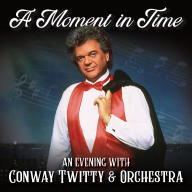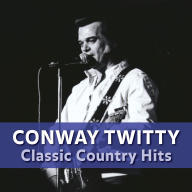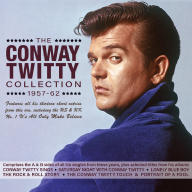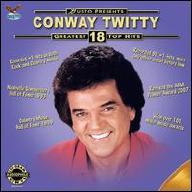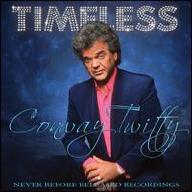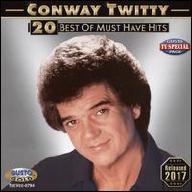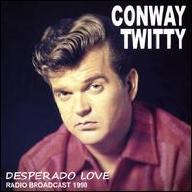The son of a riverboat captain, Twitty (born Harold Lloyd Jenkins, September 1, 1933; died June 5, 1993) was born in Mississippi and raised in Helena, AR, where he learned to love not only country, but also blues and gospel. When he was ten years old, he joined his first group, the Phillips Country Ramblers, who occasionally performed on local radio. Despite his interest in music, he originally planned to become a professional baseball player. Jenkins was talented enough to be offered a contract by the Philadelphia Phillies, but he was unable to join the team, since he was drafted into the Army during the Korean War. While he was serving in the Far East, he sang with a country band called the Cimarrons. Returning to America in 1956, Jenkins still had an open offer to join the Phillies, yet he decided to pursue a musical career after he heard Elvis Presley.
With dreams of recording for Sun Records, Jenkins headed to Memphis, where Sam Phillips did indeed sign him to a recording contract, but none of the tracks he cut were ever released; Jenkins' biggest contribution to the label was writing Rock House, a minor hit for Roy Orbison. Leaving Sun in late 1956, he set out on a rockabilly package tour, during which he invented the stage name of Conway Twitty by combining the names of an Arkansas and Texas city, respectively. At the beginning of 1957, he signed to Mercury Records, where he released a handful of singles that didn't make much of an impact, though I Need Your Lovin' scraped the very bottom of the pop charts. In 1958, he moved to MGM Records, where he finally achieved success with It's Only Make Believe, a song he had written with Jack Nance. Recorded with vocal support by Presley's back group, the Jordanaires, It's Only Make Believe became a major hit, spending two weeks at number one and going gold. Over the course of 1959 and 1960, Twitty released a number of singles, the most popular of which were the Top Ten Danny Boy and Lonely Blue Boy, and appeared in the B-movies Sex Kittens Go to College, Platinum High School, and College Confidential.
Twitty's rock roll fame arrived suddenly and it went away just as quickly. By the beginning of 1961, his singles had stopped entering the Top 40. Nevertheless, he continued to tour, but soon MGM dropped him from their roster. Signing with ABC-Paramount, he began to add more country songs to his repertoire, yet he was still primarily recording pop material. Once Ray Price took Twitty's Walk Me to the Door to the country Top Ten, Conway decided he wanted to become a country singer, but he didn't actively pursue that avenue until 1965, when he walked out in the middle of a concert at a New Jersey nightclub. By the end of 1965, Twitty had begun a collaboration with record producer Owen Bradley, one of the cornerstones of the Nashville sound, and had signed to Decca Records. In the spring of the following year, he released his first country single, Guess My Eyes Were Bigger Than My Heart, which peaked at number 18. For the next two years, he had a steady stream of four minor hits, finally breaking into the Top Ten with The Image of Me in the spring of 1968, followed a few months later by his first number one hit, Next in Line. For the next four years, he had a string of 12 Top Five singles for Decca, eight of which -- including I Love You More Today, To See My Angel Cry, Hello Darlin', Fifteen Years Ago, and How Much More She Can Stand -- were number one hits.
In late 1970, he began a professional relationship with Loretta Lynn, releasing their first duet, After the Fire Is Gone, early in 1971. The record became the first of five straight number one country hits, which also included Lead Me On, Louisiana Woman, Mississippi Man, As Soon as I Hang Up the Phone, and Feelins'. Over the course of the decade, Twitty and Lynn continued to work together, releasing one album a year and racking up a total of 14 Top Ten hits; they also won four Duo of the Year awards from the Country Music Association, three Vocal Group of the Year honors from the Academy of Country Music, and one Grammy for Best Vocal Performance by a Group (After the Fire Is Gone).
Twitty's solo career continued to thrive alongside his duets with Lynn. In 1973, Decca became absorbed by MCA Records, and all of his new records were released on MCA. The changeover in labels happened to coincide with an increased suggestiveness in much of his material, including the major hit single You've Never Been This Far Before, which spent three weeks at number one during the summer of 1973, despite being banned by several radio stations. Not all of his songs were as explicitly sexual, yet they all had an adult theme and their layered, string-laden production was designed for more mature audience, who bought Twitty records in droves. Until 1983, he had a remarkably consistent string of Top Ten singles for Decca, most of which hit number one. Among his best-known hits from this era were I See the Want To in Your Eyes, Linda in My Mind, Touch the Hand, After All the Good Is Gone, I've Already Loved You in My Mind, Happy Birthday Darlin', Tight Fittin' Jeans, and Red Neckin' Love Makin' Night. As he continued to rule the charts, Twitty expanded into other business ventures, including banking, property, a booking agency, and ultimately, a theme park called Twitty City. The size of his international popularity was confirmed when he re-recorded Hello Darlin' in Russian for a joint American/Soviet space mission.
In late 1981, he briefly moved to Elektra, where he released several hit singles, many of which were pop covers like the Pointer Sisters' Slow Hand and Bette Midler's The Rose. Twitty signed with Warner Bros. in 1983, where he had a string of hits over the next three years. Again, he covered several pop songs -- the Eagles' Heartache Tonight, the Commodores' Three Times a Lady -- but he kept recording country songs, including the number ones Somebody's Needin' Somebody, I Don't Know a Thing About Love (The Moon Songs), Don't Call Him a Cowboy, and Desperado Love, a 1986 chart-topper which proved to be his last number one.
Twitty returned to MCA in 1987, releasing the back-to-back number two hits Julia and I Want to Know You Before We Make Love. Though he continued to have Top Ten hits through the end of the decade, his success began to slip slightly in the early '90s, once new country forced older performers off the top of the charts. Nevertheless, he remained quite popular, selling both records and concert tickets, until his sudden death from an abdominal aneurysm in the summer of 1993. Immediately following his death, Twitty was praised and mourned from all quarters of the public, not just country music fans, and his record of over 40 number one hits (matched only by George Strait in 2009) remains a high-water mark. ~ Stephen Thomas Erlewine, Rovi


